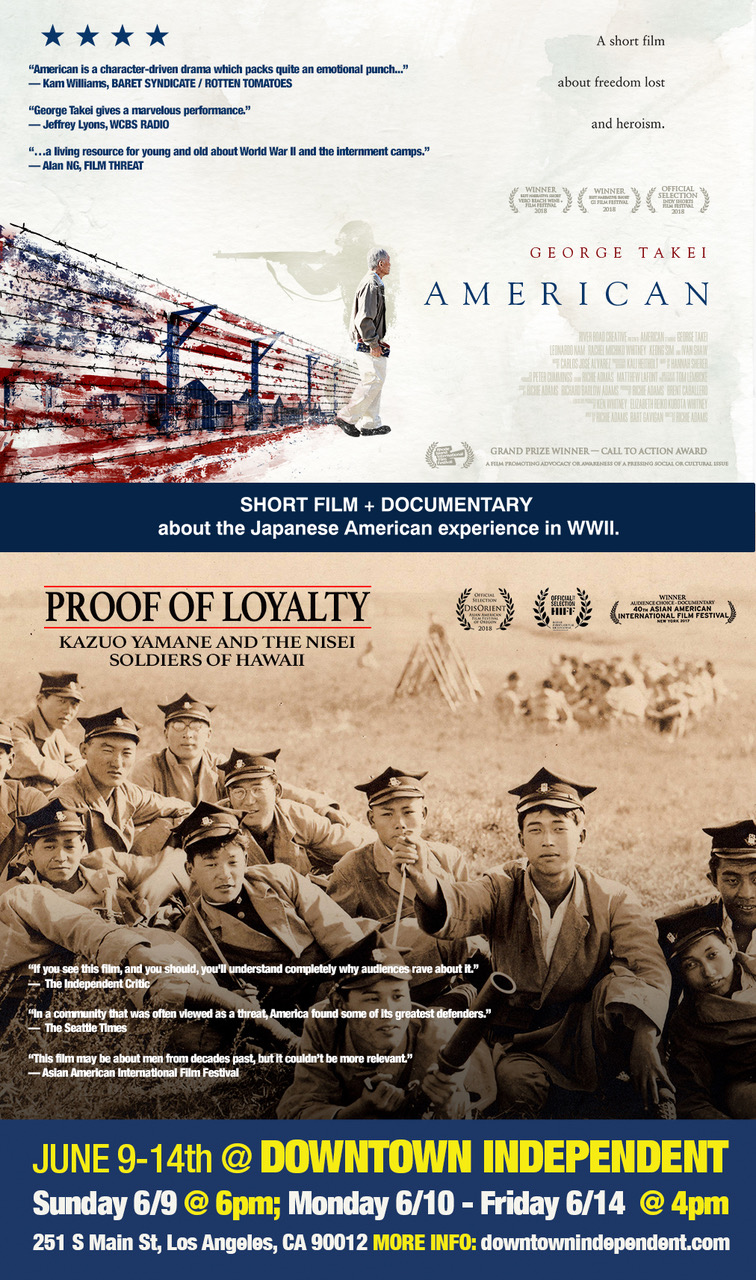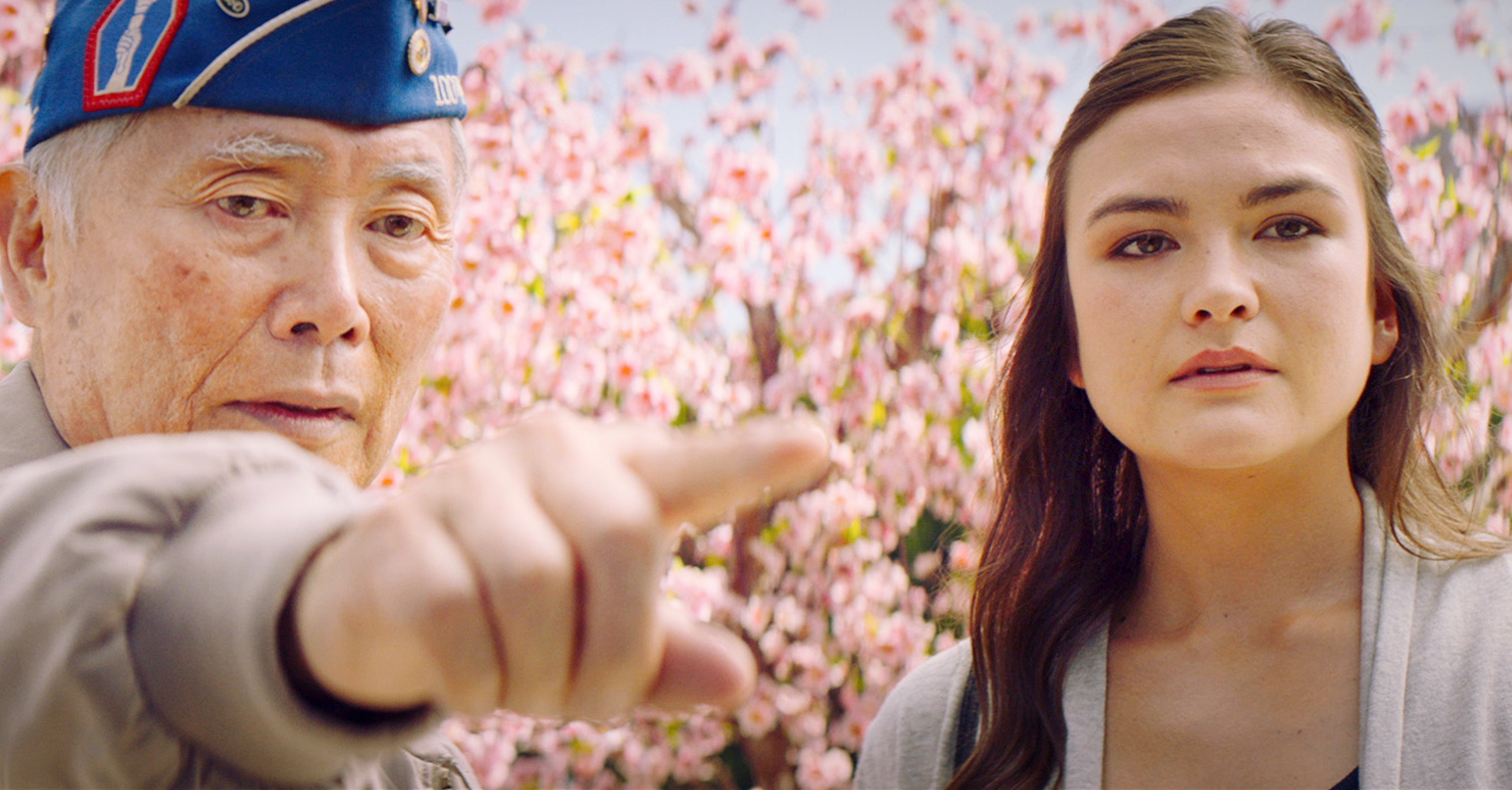George Takei and Rachel Michiko Whitney co-star in “American,” which is part of a double-bill with “Proof of Loyalty: Kazuo Yamane and the Nisei Soldiers of Hawaii,” playing in Los Angeles from June 9–14.
‘American’ gets help from ‘Proof of Loyalty’ for Oscar eligibility
By George Toshio Johnston, Senior Editor, Digital & Social Media
Beginning Sunday, June 9, through Friday, June 14, a cinematic one-two punch of Japanese American military service will land in Los Angeles.
Taking place at the Downtown Independent theater will be a double-feature showing consisting of 2017’s 55-minute-long documentary “Proof of Loyalty: Kazuo Yamane and the Nisei Soldiers of Hawaii” and the new dramatic short “American,” starring George Takei and newcomer Rachel Michiko Whitney.
The former, which aired nationwide on Veterans Day 2018 on PBS after a fruitful film festival run, was produced and directed by Bainbridge Island, Wash.-based filmmakers Lucy Ostrander and Don Sellers.
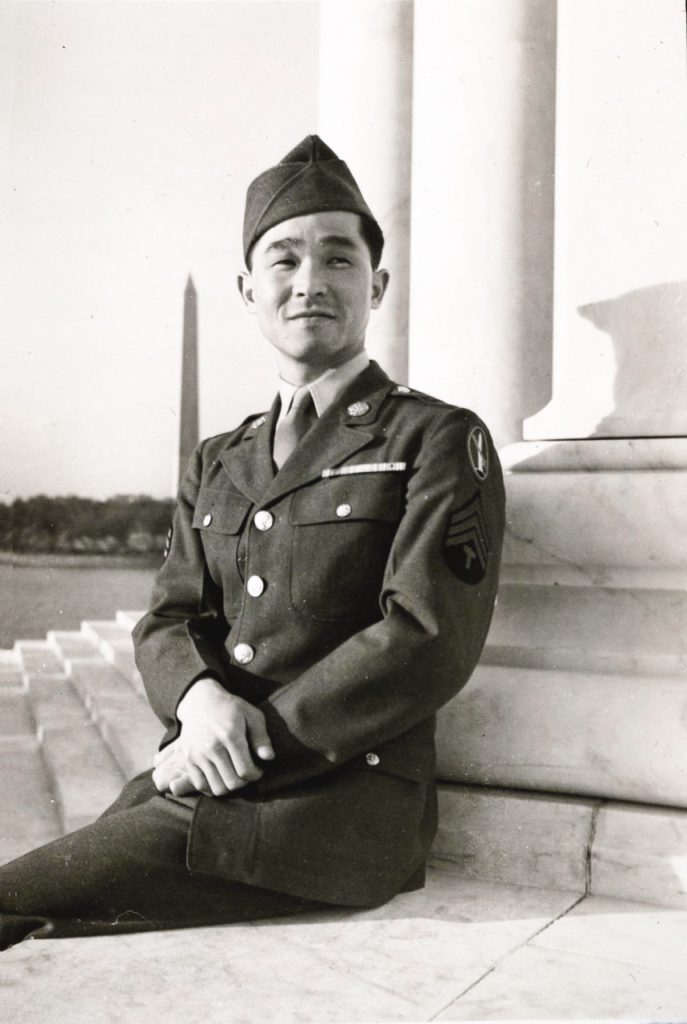
Kazuo Yamane
“Proof of Loyalty” focuses on Hawaii-born Kazuo Yamane, who, during World War II, served in the Army’s Military Intelligence Service as one of just a handful of Japanese American linguists to serve in the European Theater, in this case under Gen. Dwight Eisenhower. (The movie’s title actually refers to vital Japanese military documents translated by Yamane while serving in Europe.)
“American,” meantime, is a new dramatic story about a 100th Battalion/442nd Regimental Combat Team veteran named Clinton Nakamoto (played by Takei), who volunteers as a docent at L.A.’s Japanese American National Museum. One day, he encounters the descendants of a fallen comrade named David Seki during their visit to JANM, and as a result, he has an unexpectedly emotional flashback to a traumatic time from when he was a young man.
What: Screenings of “Proof of Loyalty: Kazuo Yamane and the Nisei Soldiers of Hawaii” and “American”
Where: Downtown Independent Theater, 251 S. Main St, Los Angeles, CA 90012. Tel.: (213) 617-1033
When: Sunday, June 9–Friday, 14
Times: June 9: 6 p.m.; June 10-14: 4 p.m.
Tickets: $12 (call theater for senior citizen ticket price)
Visit: richieadams.com/american and proofofloyalty.com for more information.
The screenings (see info box above for dates, times and venue) aim to meet the eligibility requirements of the Academy of Motion Picture Arts and Sciences in order to be considered for an Oscar in the live-action short film category for “American,” an 18-minute-long movie written and directed by Louisiana-based filmmaker Richie Adams and executive produced by Liz Reiko Kubota Whitney and Ken Whitney.
Bainbridge Island Connection

Filmmakers Don Sellers and Lucy Ostrander directed “Proof of Loyalty: Kazuo Yamane and the Nisei Soldiers of Hawaii.” (Photo: Stourwater Pictures)
For documentarians Ostrander and Sellers, living on Bainbridge Island, Wash., had “everything to do with the fact that we did this,” said Sellers, referring not only to “Proof of Loyalty” but also several other works that have had Japanese American subject matter: “My Friends Behind Barbed Wire,” “Honor & Sacrifice: The Roy Matsumoto Story” and “Fumiko Hayashida: The Woman Behind the Symbol,” as well as other Asian American-themed documentaries “Island Roots: Portrait of a Filipino-American Community” and “Home From the Eastern Sea.”
“Bainbridge Island had a very unusual history in terms of different types of people who came from different places all over the world who lived here. There was a real rich texture of ethnicity on this island,” Sellers said, referring to the Japanese, Scandinavians, Native Americans and later, Filipinos, who worked at the lumber mill at Port Blakely.
“In the late 1800s, it was the largest lumber mill in the world, and it was better known than Seattle,” said Ostrander, who noted that they had been commissioned to produce a documentary about the mill.
The island’s history of ethnic diversity and harmony was underscored during WWII, when journalists Mildred and Walter Woodward Jr. famously editorialized in their Bainbridge Review for constitutional protections to apply to all Americans and against the mass incarceration of Japanese Americans.
“During WWII, Bainbridge Island was Exclusion Order No. 1, the first community in the country where Japanese Americans were taken away,” Ostrander said.
Enter Yamane
As for the genesis of “Proof of Loyalty,” Joyce Yamane — the Hawaii-born Sansei daughter of Kazuo Yamane who resides in Washington State — says it was she who approached Ostrander and Sellers after a buying a copy of “Honor & Sacrifice” during a visit to the headquarters of the National Japanese American Historical Society in San Francisco.
For several years, she had struggled over what to do with the photo albums, documents and memorabilia inherited from her late father for the benefit of his descendants.
From feedback she had received from others, she knew some of it was quite valuable — but her main goal was to pass along the story. Then, she watched 2013’s “Honor & Sacrifice.”

The Yamane family store in Hawaii (Photo: Courtesy of the Yamane Family)
“I thought, ‘This is what I want to do with the family archives and my father’s numerous photo albums from WWII,” Yamane told the Pacific Citizen. “I called [Sellers and Ostrander], and we connected.”
While the filmmaking couple had done much already on mainland Japanese American subject matter, they knew little of the particulars of the Hawaii Japanese American experience.
“It was a true learning curve for them,” Yamane said
Ostrander and Sellers concurred, noting that it took two and a half years to complete “Proof of Loyalty,” with one year spent just doing research. As they delved through the materials provided by Yamane, they realized that their original idea to produce a 30-minute-long documentary wouldn’t do justice to the depth of the story — and it went to 55 minutes.
“It took us a long time to piece everything together,” Sellers said, because they needed to learn about the history of Japanese Americans in Hawaii. “Without understanding the context of Hawaii and the Japanese Americans in Hawaii, it wouldn’t have the impact of what we were able to
finally achieve.
“The arc of the story is the arc of Kazuo Yamane’s life before the military and in the military,” he continued. “But it’s also the overall experience of the Nisei from Hawaii during WWII. So, those two arcs are going on simultaneously.”
For Yamane, the documentary achieved what she wanted.
“They did an excellent job of generational sweep, which was what I was intending, so the Yamane descendants could all understand the sacrifices and challenges the Issei went through,” Yamane said. “That was the whole point because oftentimes the younger generation now has no idea what the Issei and the Nisei went through. What started out as a family heritage movie has ended up to be a really rich educational resource for history — for all ethnic groups.”
Festival Friends
Once completed, Ostrander and Sellers took “Proof of Loyalty” on the festival circuit, where it screened at such locations as the Hawaii International Film Festival on Veterans Day 2017, New York’s 2017 Asian American International Film Festival (where it was selected the Audience Choice in the documentary division), the Los Angeles Asian Pacific Film Festival, the Northwest Filmmakers’ Festival and the Sedona International Film Festival.
During that run, “Proof of Loyalty” was often paired with “American,” according to writer-director Adams. The pairings were how he met Ostrander and Sellers.
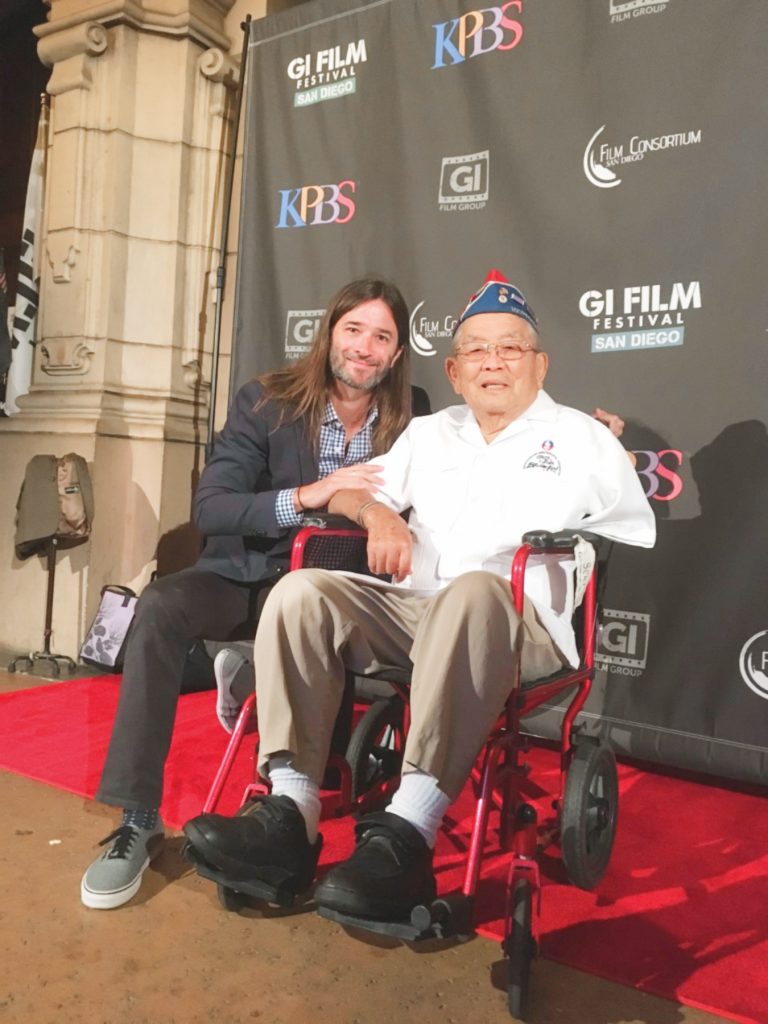
“American” director Richie Adams and 100th Battalion/442nd Regimental Combat Team veteran Don Seki. (Photo: Courtesy the family of Don Seki)
For Adams, completing “American” had its challenges — but also some unusually fortuitous circumstances that put wind in its sails.
A writer and director who also runs a Louisiana-based company that creates title sequences for movies, Adams directed 2014’s “Of Mind and Music,” a feature film about the power of music for dementia patients.
Ken Whitney, meantime, had been an executive producer on a 2016 movie titled “Tommy’s Honour,” about father-son golfers Old Tom Morris and Young Tom Morris, and their relationship serving as the heart of that story. (It won a BAFTA Scotland in the best feature film category in 2016.)
Both Ken and Liz Whitney had also been passive investors in some Broadway shows and were direct investors in “Fun Home,” which won a Tony award in 2015 for best musical.
“After you make a movie, and people know that, you start to get some phone calls,” Ken Whitney said, relating how a friend who was a colleague of Adams’ father suggested that he meet Adams, which happened after the Whitneys viewed “Of Mind and Music.”
Leaving a Legacy
“We really liked Richie,” said Ken, noting that he and Liz were looking into doing some projects with him. There were discussions of working on a feature project, according to Adams, but they decided to put that project on hold.
“I recall the conversation that we had at the very beginning when we met, and I kind of told him, ‘What I’d like for you to know about me as a filmmaker is that I want to be a part of projects that will ultimately leave a legacy of some kind,’” Adams said.
Adams said Ken Whitney responded by telling him he was very interested in somehow telling a story “that honors the experience that my wife’s family had endured during WWII, through Japanese American internment camps.”
Adams admitted that at the time his knowledge regarding the experience of mainland Japanese Americans during WWII was limited.
The Louisiana-native noted that “being in the South, it’s just not something that’s covered.” Still, a seed of an idea was planted.
“Actually, I came to learn that many folks, regardless of if you’re from the North, South — wherever in the U.S. — if you weren’t directly affected, many folks hadn’t heard about it,” Adams said.
Adams eventually approached Ken and said to him, “Would you have an interest in a short film about the Japanese American internment story? I have kind of a rough idea.”
The Whitneys were interested, but they wanted more. Adams took it upon himself to write a screenplay for his idea, centering on an elderly Japanese American veteran of the 100th Battalion/442nd Regimental Combat Team who, in the present day, volunteers as a docent at the Japanese American National Museum and was himself a former concentration camp incarceree. The Whitneys liked it very much.
Camp Connection
“I said, ‘I’d like to go to George Takei with it,’” Adams recalled telling the Whitneys — but he didn’t know how to get the script to him. It was then that they told him of Liz’s familial connection with Takei. It would be one of the many fortuitous incidents that helped to get “American” made.
According to Liz, her parents, Florence and Tsugio Kubota, met while they were incarcerated at the Rohwer War Relocation Authority Center in Arkansas. (Many years later, according to Liz, Tsugio Kubota served as president of the Stockton JACL chapter.) Rohwer was also the same camp where George Takei’s family was incarcerated.
“My mom’s family was in the same block. George’s family lived in the barracks right across where my mom’s family’s barracks were, on the end,” Liz said. “My mom was one of seven kids, and they had more than one barrack.”
Her mother, Florence Shimazaki at the time, was forcibly removed from the West Coast when she was 17 and didn’t graduate from her original high school. Later in camp, she got a job as the block secretary, and she worked for George Takei’s father, who was the block manager. Florence still remembered the 5-year-old George Takei running around the office.
Via Liz’s brother, Glenn, who is also an actor, Liz and George connected. “When I spoke with George, and I told him about my mom, he said, ‘I remember being in my dad’s office, seeing this young woman and her fingers just flying over this typewriter!’ So, he had that memory.”
As it turned out, Florence Kubota would later reconnect with George Takei in person when she flew from her home in Lodi, Calif., to see “Allegiance” when it was running on Broadway.
With Takei now connected to the Whitneys, they were able to get Adams’ script to the “Star Trek” alumnus, via actress Marilyn Tokuda (who appears in “American”), whom Liz knew from when she, too, was pursuing an acting career.
“What I’ve learned in the entertainment business is nobody gets back to you very quickly. George got back to us right away,” said Ken. “He read it, he liked it. I think within two weeks he told us he would do it.”
Adams said that Takei sent him a note that said, “Richie, your story is haunting me. I can’t get it out of my mind. You have a very important project that I would like to be a part of. What’s the next step?”
“It was like two months later that we found the dates to film in L.A.,” said Ken, with the shoot taking place in July 2017. There was also a major part for Rachel Whitney, one of the Whitney’s three daughters. She plays the granddaughter of Takei’s character’s KIA buddy.
More Good Fortune
In the present day, Takei’s character, Nakamoto, wears a red, white and blue garrison cap used by veterans who served in the 100th/442nd. It was not, however, something from an L.A. prop house. With production about to get under way, Adams said the one important part of Takei’s wardrobe that was missing was that garrison cap.
“I just thought, ‘It’s Los Angeles, there’s umpteen prop houses, someone has to have this cap,’” he said. But the production designer said they had looked everywhere and one could not be found.
Desperate, Adams called Mitch Maki, the CEO of the Go for Broke National Education Center, and he put out the word out. Adams said that in a matter of 30 minutes, he got an email from Tracey Matsuyama, the daughter of 442nd vet Don Seki.
Matsuyama not only lent Adams her father’s garrison cap to be used as a prop, but his real medals also appear in the movie.
“They are an incredible, just wonderful patriotic family,” Adams said.
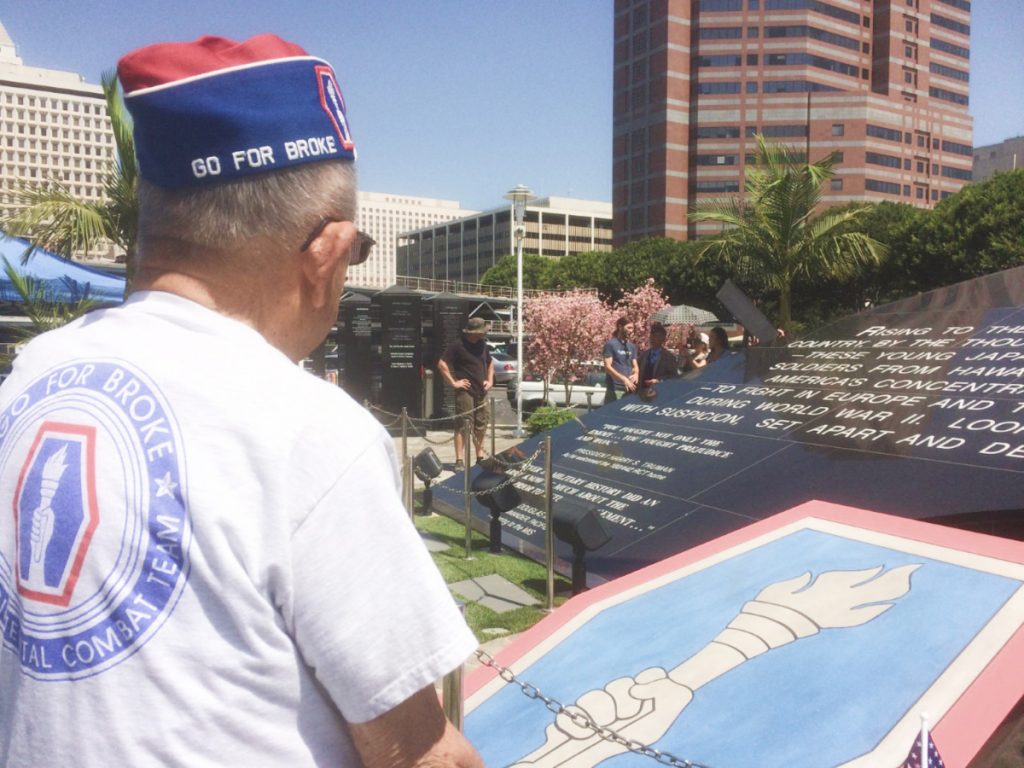
Don Seki prepares to film his cameo appearance in “American” at the Go for Broke Monument in Los Angeles’ Little Tokyo. (Photo: Courtesy of the family of Don Seki)
Seki and Matsuyama even make a cameo appearance in the movie. And, the character David Seki share a last name and first initial.
Later, that cap provides a touching payoff at the movie’s conclusion.
With a busy schedule running his title company, however, it would take until January 2018 to complete, with “American” going on the film-festival circuit route in March 2018 at the Newport Beach Film Festival.
It nevertheless went though several different cuts or versions — including one that they considered submitting to the Festival de Cannes, but due to a 15-minute time limit, discarded because it left out too much.
With both “Proof of Loyalty: Kazuo Yamane and the Nisei Soldiers of Hawaii” and “American” sharing a double-bill, Ostrander thinks the respective films tell an important story that is relevant to today’s status quo.
“We think they are incredibly timely, especially with what’s going on with our country today,” said Ostrander.
